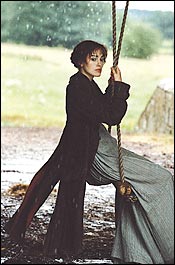
Anyone working up a good derisive snort at this movie’s tagline—“Sometimes the last person on earth you want to be with is the one person you can’t be without”—would do well to snort-suppress: The 1940 Laurence Olivier–Greer Garson version of Jane Austen’s most famous novel was promoted with the slogan “When pretty girls t-e-a-s-e-d men into marriage.” There’s always been a Cosmo-girl approach to peddling Austen’s wares; the movie industry is perpetually jittery around the author’s razor-edged comedies of manners (All those words! All those crucial things left unsaid in the silences between those words!) and invariably tries to promote them as silly fun for the popcorn chewer. (The one terrific success that merited such treatment, of course, was Amy Heckerling’s Clueless adaptation of Emma.)
In the new Pride & Prejudice, Keira Knightley glides around with great assurance, tossing off barbed observations about her dithery mother and the foolishness of her four sisters. Indeed, Keira’s cat-smile suggests such supernal all-knowingness that, with Austen’s adapted dialogue (via Deborah Moggach) tripping off her tongue, she comes off as an eighteenth-century Maureen Dowd. Any suitor of sense and sensibility would steer clear of Knightley’s Elizabeth Bennet, lest the fangs and claws come out too quickly. The actress’s feral intelligence is similar to the fierceness she brought to her recent run-in with director Tony Scott’s exploding editing machine, otherwise known as Domino.
But it’s a good bet that the only moviegoers who will have seen both Domino and Pride & Prejudice are film critics, and so we’ll be spared, I presume, movie-lobby riots in which ticket holders brawl over whether Mickey Rourke—who displayed such touching chemistry with Knightley as he instructed her on the fine points of blasting holes into bail jumpers—would have made a better Mr. Darcy than Matthew Macfadyen. Actually, I daresay that anyone, including Mr. Rourke or even Gilbert Gottfried, would have made a livelier match for Knightley’s Elizabeth Bennet than the sour Macfadyen. He frequently looks merely peeved or perhaps hungover, as though director Joe Wright had tricked him into wearing poufy clothes after a long night out at the pub.
In condensing to a mere two hours Austen’s elaborately arrayed tale, this P&P will probably not pass muster with those viewers who still tremble happily at the memory of the BBC’s five-hour-plus 1995 production, which starred Colin Firth as the most hotsy Darcy ever, give or take your imagination the first time you read the book. Still, there are pleasures to be had here. The boobish Mr. Bingley (Simon Woods, sporting bright red hair styled to resemble Archie Andrews) makes a rare intelligent remark when he observes (in the novel; the movie has no time for such felicities) that Elizabeth is an astute “studier of character.” Thanks to the vivacious and brainy Knightley, the new P&P renders this quality exceedingly well, and when you combine her with Donald Sutherland, portraying Elizabeth’s father as a man who knows which daughter to adore while merely loving the others, the movie has moments of true Austen shrewdness. The comedy is provided by women at two extremes—Brenda Blethyn is a marvelous mutton-head as the Bennet mother, and Judi Dench is a mensch as the maleficently meddling Lady Catherine.
If only Knightley had a co-star equal to her here: The 1995 edition of Colin Firth, come to think of it, would have been perfect. As it is, we get something appropriate—an earthbound Pride & Prejudice, as befits the sins and errors of its title—when what we want is what we always want from a romantic period piece: something transcendent. Maybe in the techno-future, when we’ll all sit around creating our own films on sub-iPod-size gizmos, we’ll be able to splice together Knightley and Firth and achieve a mash-up made in movie heaven.
Pride & Prejudice
Directed by Joe Wright.
Focus Features. PG.